- About
- Visiting
- What’s On
- Venue hire
- Catalogues
- Collections
- 101 Treasures of Chetham’s
- Digital Resources
- The Flowers of Histories
- A Book of Hours from France
- The Manchester Scrapbook
- Thomas Barritt of Manchester
- Art Treasures Examiner of 1857
- Manchester Association for Constitutional Order
- The North Western Museum of Science and Industry: Some Reminiscences by Richard Hills
- Criminal Manchester
- The Cup of Destiny
- Athenaeum Souvenir
- Middle English Manuscripts
- Manchester and Liverpool of Today
- Hollingworth’s Mancuniensis
- Memoir of Cecil Wray
- William Seward’s Diary
- The Anti-Monopolist
- Fishwick’s History of Rochdale
- Knyvett’s Defence of this Realm
- Tractatus de Nigromantia
- Axon Ballads
- Printed Books & Ephemera
- Archives & Manuscripts
- Prints and Photographs
- Blog
- Support us
Weird and wonderful: Edwardian Christmas cards
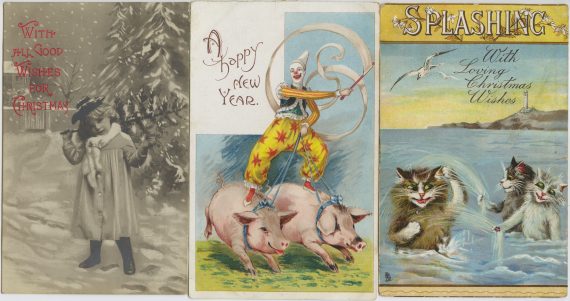
It’s at this time of year, when the annual festivities are almost upon us, that Library staff are inspired to consult the collections in search of something that captures the spirit of the season. And what could be more festive than an album of antique Christmas cards? Well … you decide.
These postcards are from our fascinating Leech collection, the huge personal archive of one Manchester family, spanning 150 years, from the early 19th to the mid 20th century. The postcard album dates from the early 1900s and the card designs run the gamut of festive experience, from the warm and sentimental to the humorous and downright bizarre.
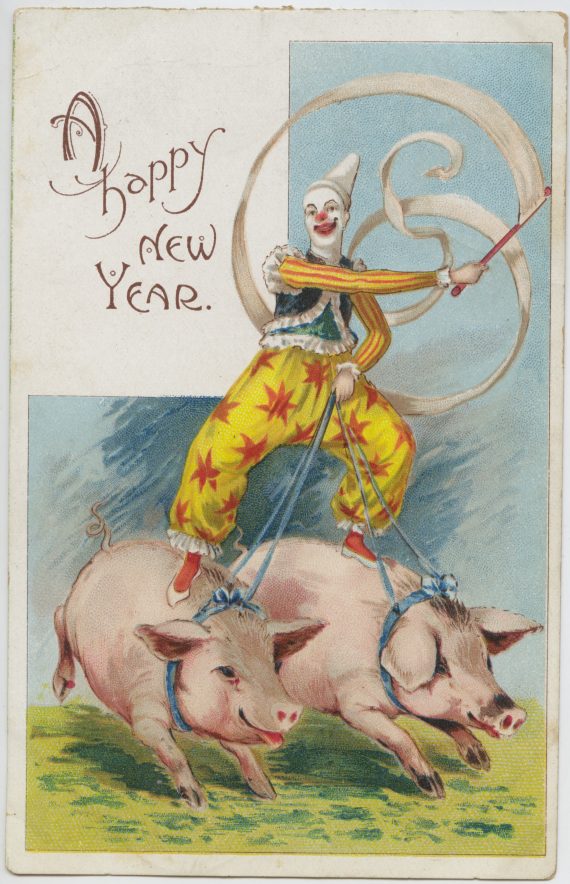
A happy New Year
The clown/pig postcard clearly captured the imagination of a young boy called Frank, who sent it to his friend, Kenneth, on 19 Dec 1906, with the message, ‘Will you come to our party?’– in a recognisably child-like hand on the reverse.
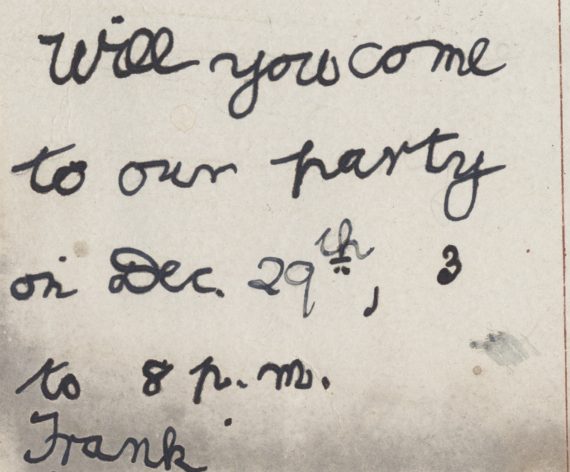
‘Will you come to our party?’
This ‘Splashing’ card was another Kenneth received, ‘With Loving Christmas Wishes’ and (on the reverse) ‘love from Victor’. Cats playing in the sea. It’s an odd image for yuletide but perhaps alluded to the tradition of the Christmas-day dip.
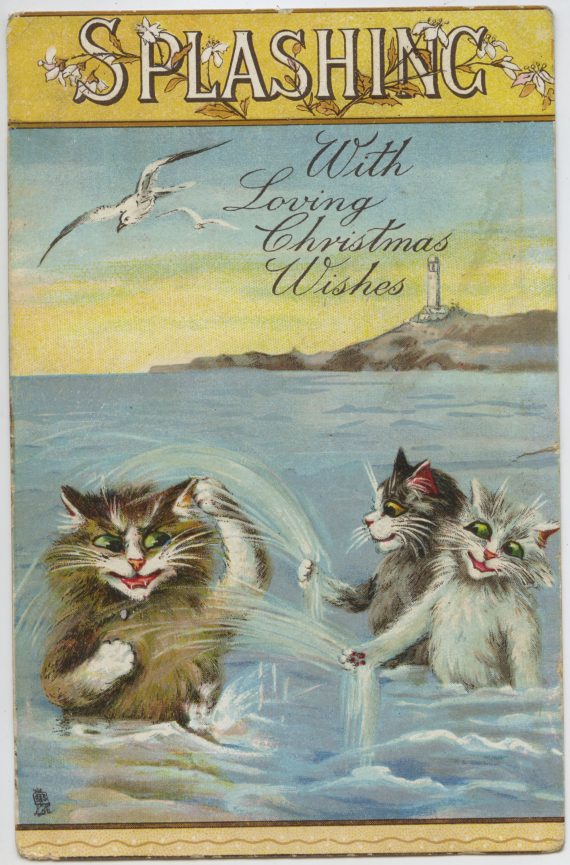
SPLASHING
Several of the cards depict festive scenes of yesteryear, like this one showing how Christmas probably was (not) in Tudor England –
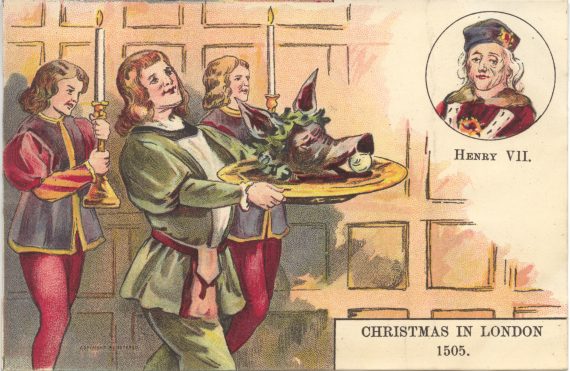
Christmas in London 1505
– And this one, illustrating London in 1705 –
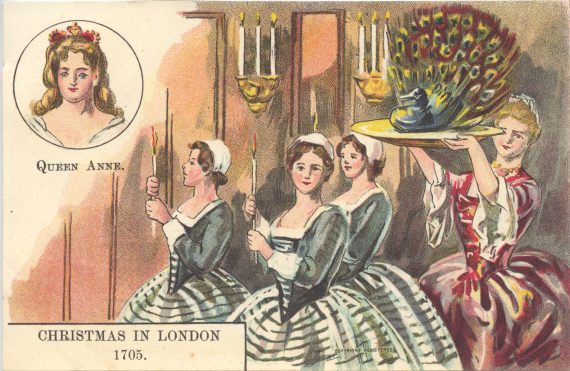
Christmas in London 1705
Others in the album are more conventional –

Christmas Greetings
But a particular highlight is this child’s handmade card, in pencil and watercolour. There is no name or date, so we can only guess that it was made by one of the Leech children (whose drawings and handmade books can be found elsewhere in the archive). It is filed alongside postcards of a 1908-1911 date.
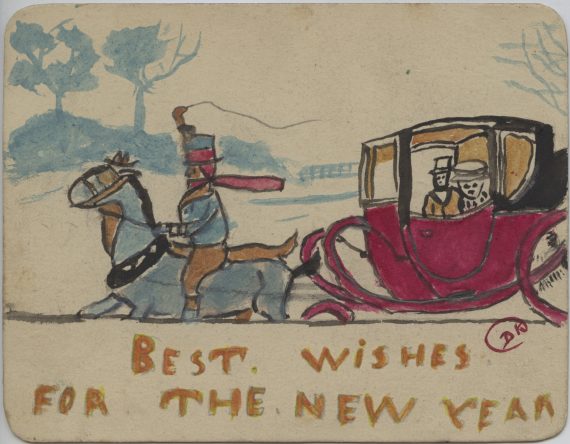
Hand-painted card, n.d.
The Christmas postcards, in all their variety and eccentricity, are an example of what makes historical archives so compelling. Preserving brief moments in time, they provide candid insights into a past that is both instantly relatable and strangely unfamiliar. They are sometimes amusing, sometimes thought-provoking, and sometimes give us a better understanding of other times, people and places. It is why a collection like the Leech archive, which includes many hundreds of items of the most ordinary kind, is so valuable to us now.
(Although, if you’re a natural hoarder, it might be best that you don’t think too deeply about that when you’re clearing away your Christmas cards!)
If you enjoyed this, why not Tweet it to friends or Follow @chethamslibrary?
